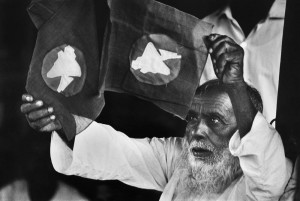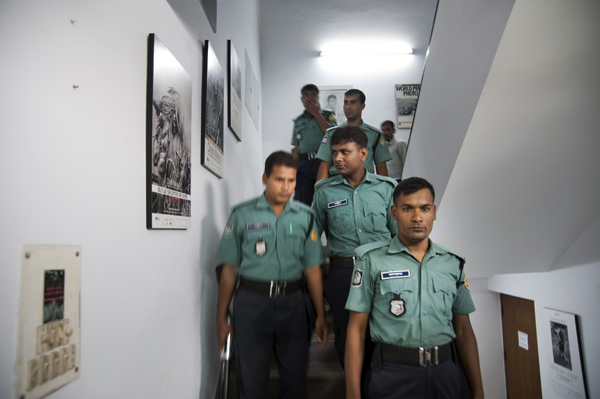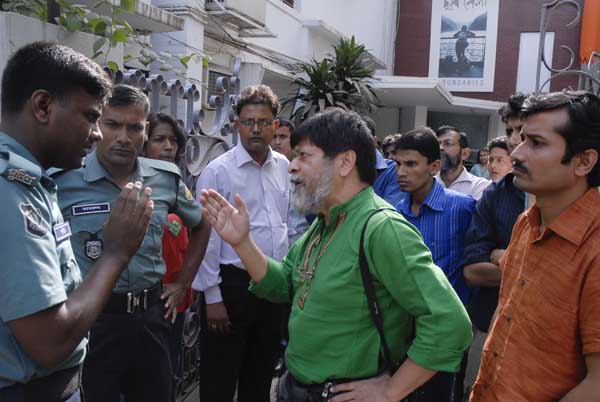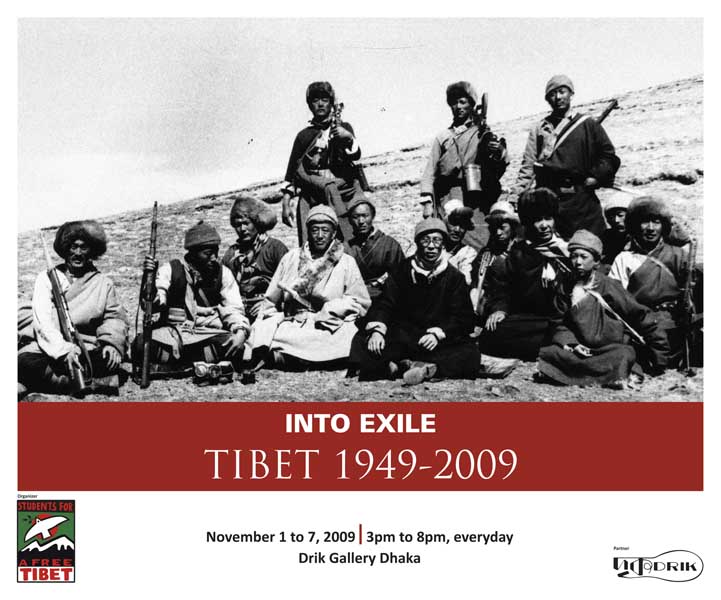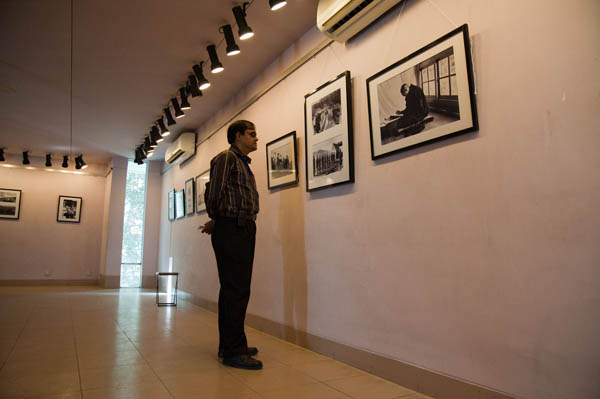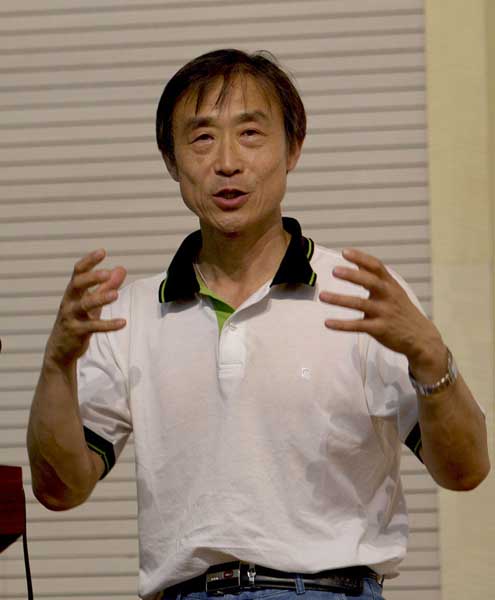By Rahnuma Ahmed
As a New Age columnist, I was thinking of writing about the controversy surrounding the Tibet exhibition (Into Exile. Tibet 1949 ? 2009, November 1-7) for my next column. My dear Maobadi friend, Tarek Chowdhury’s piece, which he was kind enough to forward me, had meanwhile been published in Samakal (`Tibboter odekha chobigulo onek kotha boley,’ November 13). Since some of our political concerns and perspectives are shared, since I benefited from his piece as I did from that of other writers who had trodden the path before me, who have extensively researched and written on China, Tibet and US imperialism, who have carefully built up their arguments and critiques based on a close scrutiny of facts and figures and have thereby helped deepen our understanding of imperialism, I drew on them. Unflinchingly. Unreservedly. Of course, I was careful to credit ideas as I went along (but not all. For instance, although I learned a lot from reading pieces by authors such as Michel Chossudovsky, F. William Engdahl and others, they were not named since I had not directly cited them. For an ex-academic like me, the space constraints of column-writing have been a learning experience).
In `Smoking Gun Abused for Smokescreen‘ (December 13) Tarek assumes that what I wrote in my column (‘China-US politics over exhibiting Tibet. In Dhaka,? November 23) was a `response’ to his Samakal op-ed. But if I had felt obliged to pen a response, surely??I would have written it up as that, and sent it off to Samakal?
I wrote as a columnist, not as Drik’s spokesperson. I have never done thus, because I do not see myself in that role. Neither, I think, do my readers (nor Shahidul Alam, or anyone else at Drik for that matter, but that’s beside the point). Secondly, I do not think my task is to pass judgment (`we don?t see Rahnuma draw any judgement about the SFT?the real ?area of contention? between us’). Not on SFT (Students for a Free Tibet), nor on anything else. That work, I think, is best left to judges. As a writer, I work towards contributing in, and in opening up further, spaces of critical thinking. Hence, I map out fields of debate, I position myself within the debate, often bringing into the discussion issues which have escaped the attention of other writers (in this case, `neat fit,’ Guantanamo, which I will go into later). I constantly seek to clarify why I think and believe what I do, as I do. Readers are intelligent people; in my view, they are both capable of, and also free to, reach their own conclusions which may, or may not, be in agreement with mine. To try and persuade, yes. To argue, yes. To pass judgment, no.
And hence, what I wrote in my column was obviously framed by my concerns (which would not have been the case if I was writing a `response’). After briefly describing what had happened (a visit by Chinese embassy officials, followed by Bangladesh intelligence, eventually a lock-up of Drik’s premises by the police), I wrote about what Tarek had written in his Samakal piece: the SFT, its funding sources, his suspicion about the timing of the exhibition, CIA funding of the Tibet movement through NED (National Endowment for Democracy). I then drew on the work of others who have researched on the SFT/NED/CIA nexus to elaborate on Tarek’s argument, and to offer my readers additional evidence: NED’s Reagan-ite origins, the roles of the (present) Dalai Lama’s brothers in the Tibet resistance movement during the 1950s in which the CIA had been active, had trained guerrilla units etc. etc.
After this, I broached the issue of cultural and political activism, seeking Shahidul’s response: an `opportunity to see rare photos,’ `we have faced pressure before,’ even `progressive institutions’ have wanted us to practise `self-censorship’; this I juxtaposed with Barker’s argument, namely, that progressive activists, both Tibetan and foreign, should first and foremost cast a critical eye over the `antidemocratic’ funders of Tibetan groups, or else, a progressive solution to the Tibetan problem, a `more thoroughgoing democratisation of [Tibetan] social life’ will not be generated. But Shahidul had said that Drik was not above criticism, that it was welcomed, and I expected readers to remember that. For me, the obvious implication of what he’d said was, whether Drik’s decision to co-host the exhibition was right or wrong should be a matter of public debate. It would give Drik the opportunity of critically appraising itself.
As for what I had written, it’s implication was much sharper. If formulated as a question it would stand thus: should Drik, as a progressive institution, have agreed to partner an exhibition with the Bangladeshi chapter of SFT, since the latter (the parent organisation) receives funding from NED, which now does what was covertly done by the CIA 25 years ago, even though the exhibition gives members of the public an opportunity to see a collection of rare photographs? This clearly was a matter for public debate (not a matter of my passing a `judgment’). I was certain that intelligent people/readers would clearly see what I was driving at.
I then returned to Barker’s argument. I wanted to tease it out further, not to minimise the importance of what he had said, but because I think (as probably Barker and many others do too) that there is no `neat fit’ between the different movements for freedom that different activists may, and do, simultaneously support. In other words, there is no `single’ list of freedom movements that will satisfy everyone critical of US imperialism. To illustrate my point, I drew on Mairead Corrigan Maguire, the Irish Nobel Peace laureate, who is a strong defender of both the Palestinian, and the Tibetan, cause. I pointed to the recently-launched `Thank You Tibet!’ campaign to which Mairead belongs, which extends support to His Holiness the Dalai Lama and the people of Tibet, claiming that they are a “model for all of us.”
In `Smoking Gun,’ Tarek points out that I had failed to mention Maguire’s connection to ICT (she’s a member of the International Campaign for Tibet’s International Counsel of Advisors). Also, that she’s an advisor to the Points of Peace Foundation (a media and human rights foundation located in Norway with “a mandate to support Nobel Peace Prize Laureates in urgent need of media, dialogue and communication assistance in their home countries and internationally”), and the founder of Voice of Tibet radio station (a PPF project aided by NED; the radio station, from what I gather, was founded by three Norwegian NGOs and not Maguire, as Tarek states, but it’s a slight error which is not crucial to our discussion). However, these additional? facts provided by Tarek, only serves to substantiate my point that there is `no neat fit.’ Does Maguire’s support for the Dalai Lama, her ICT membership, and being a PPF advisor weaken her credibility as a progressive activist? Does it imply that she is, let’s say, not genuinely concerned with promoting freedom and democracy in Tibet, or elsewhere, like Palestine, Afghanistan and Iraq? Even though Maguire has strongly criticised Israel, “an allegedly democratic country with a sham justice system,” ?and the Bush administration for “increasing nuclearism, ongoing wars, and the ignoring of international treaties and laws“ in articles published in CounterPunch, USA’s best known left newsletter (which has also published articles critical of “anti-Chinese frenzy in the West, pursued in the guise of pro-Tibetan… human rights activism,” John V. Whitbeck)? (CounterPunch has published articles critical of CIA, US imperialism, too countless to mention).
Maguire’s support for the Dalai Lama, interestingly enough, does not appear to have prevented US immigration officials from detaining and harassing her at Houston airport (May 2009). `They questioned me about my nonviolent protests in USA against the Afghanistan invasion and Iraqi war.’ She added, ‘They insisted I must tick the box in the Immigration form admitting to criminal activities.’ Detained for two hours, grilled, fingerprinted, photographed, then grilled again, Maguire was released only after the Nobel Women’s Initiative, an organisation she helped found, raised a hue and cry.
There are `strings attached’ to Maguire’s `compassion for Tibet,’ says Tarek. I am not clear what he means by this phrase, and much less so, by this sentence which follows soon after, `True beauty of any actor can only be judged when the audience gets the chance to take a glance at the greenroom’ ? except that it seems to imply that something sinister lies behind Maguire’s activism. If Tarek means that support for the Tibetan cause is per se suspect, then what is one to make of Archbishop Desmond Tutu’s recent decision to pull out of a peace conference meeting linked to the 2010 Football World Cup because the South African government had denied Dalai Lama a visa? (Reportedly, as a result of Chinese pressure). Further, what is one to make of Archbishop Tutu’s statement on behalf of Nobel Peace Prize Laureates, human rights leaders and concerned individuals which tells the Dalai Lama, “we stand with you. You define non-violence and compassion and goodness.” How does one view this? As naivete on the Archbishop’s part, because he does not seem to be aware of the Dalai Lama administration’s acknowledgement (1998) that it had annually received $1.7 million in the 1960’s from the CIA, spent partly on paying for guerrilla operations against the Chinese, a fact which critics say, puts His Holiness’ commitment to non-violence, as being a public face? Or, should we be looking for a `strings attached’ answer? Or do we interpret it to mean that Archbishop Tutu’s opposition to apartheid and/or his subsequent defence of human rights and? commitment to campaigning for the oppressed is not genuine, but a mere rhetorical device? Or, do we re-think some of the issues, while reminding ourselves in the process that premier Chou-en-Lai had lent his support to the Pakistani military dictatorship in 1971 when it had unleashed a genocidal campaign against the people of east Pakistan because it was in communist China’s national interest?
Tarek writes, “Mistakenly she has equated Parenti?s strong criticism of China of ?dazzling 8 percent economic growth rate? (does this apply to pre-1978 period or when HH fled to India?) with the China which ?stood up? in October 1949 under the leadership of Mao and misled her readers grossly by misrepresenting Parenti?s views.”
What I wrote was: “One area of contention [with Tarek] is an old one, centering on whether Tibet is better or worse off, under Chinese communism. As Michael Parenti, severely critical of the Hollywood `Shangri-La’ myth puts it, old Tibet, in reality, was not a Paradise Lost. But if Tibet’s future is to be positioned somewhere within China’s emerging free market paradise?with its deepening gulf between rich and poor, the risk of losing jobs, being beaten and imprisoned if workers try to form unions in corporate dominated “business zones,” the pollution resulting from billions of tons of industrial emissions and untreated human waste dumped into its rivers and lakes?the old Tibet, he says, may start looking better than it actually was.”
Now, if I were to list out the different periods and their characteristics that are packed together in this passage, this is how it would look:
1. Old Tibet/pre-Communism, was not Shangri-la/paradise lost
2? New Tibet=part of Communist China:
(a) earlier/pre free-market paradise
(b) present/emerging free-market paradise: deepening gulf between rich and poor, risk of losing jobs in corporate-owned zones, pollution, untreated human waste
As should be obvious to intelligent people/readers who know that chairman Mao was not an advocate of free market enterprise ? even to in-attentive readers because of? the word `emerging’ ? the sentence incorporates the assumption that the deepening gulf between rich and poor, risk of losing jobs in corporate-owned zones, pollution, untreated human waste etc. etc. — was unbeknownst in the New Tibet which precedes the present pre free-market paradise, in other words, it was unknown in Mao’s China.
Tarek further writes, “To make her public response to my views and questions…” which seems to imply that my `private’ response to his `Tibboter odekha chobigulo..’ (Samakal had published its own slashed-down version) had been very different. But this is how I had responded privately:
2009/11/9 Rahnuma Ahmed (translated to English)
Dear Tarek
Many thanks for writing this article, and for selecting me to be the first reader. My chief comments are:
(a) the issue of China-Tibet-US politics, and its analysis from a geo-strategic perspective, is undoubtedly interesting, and important. But when this perspective is utilised to analyse the politics of culture, it is necessary to be extra-cautious, since our conceptual tools have been developed to analyse geo-strategic politics, on the assumption that it is primary.
(b) I have felt that you view politics and political struggles conspiratorially, this diminishes the significance of your piece, for instance, you seem to view people as conspirators. To push my point further, I have felt that you did not subject the Chinese government/state to the same critical eye as you did the US and Tibet/Dalai Lama.
(c) while it is true that the US and China are opposed forces, that their political systems and ideologies are different etc., I do find their alliance in some areas — and here I am not? talking of trade relations — very interesting. For instance, the recent Uighur/Guantanamo incident. And it is incidents such as these which remind me that it is no longer possible to view China from a 1960s perspective, as a beacon of light amidst darkness. If one sticks to the dichotomy that China is `good’ and the US is `evil’ — one has to turn a blind eye to too many things, I believe this will hinder our attempts to understand the state as a historical phenomenon.
We will/must continue to argue and debate. lal salam/r
And toward the end of my column, I spoke of the Uighur/Guantanamo incident, of how Chinese interrogators had gone to Guantanamo and grilled Uighurs (a Muslim minority from the autonomous region Xinjiang, in western China), how they had been actively assisted by US military personnel to soften them up. But in hindsight, it is my second point, about a conspiratorial view of politics, that now seems almost-prophetic. Even though, I must admit, it doesn’t answer why Tarek has chosen to ignore the long response which I posted on Shahidul’s blog (December 4) in response to? questions and comments on my column `Exhibiting Tibet.’ I had forwarded him the link, he himself had posted two comments after mine. Probably, an acknowledgement would have made writing `Smoking Gun,’ with all its allegations and accusations, difficult.
When Tarek writes, “Personally, I won?t be surprised to see the SFTBD?s Bangladeshi national director (it has quite a corporate style organisational structure), the young devoted lady who ?breathes her time equally between Dharamshala ? and Bangladesh? rewarded soon by some heavyweight promoter for her superb service” (italics mine), his gaze is undoubtedly male. It is directed at male readers, written to incite their curiosity on gendered lines.
May be if Tarek had been less melodramatic, less into `actors,’ `greenrooms,’ `make-up,’ `choreography,’ `media event,’ `orchestrated propaganda,’ `dress rehearsals,’ `TV shows,’ `anchors,’ he would have digressed less. May be if he had steered clear of metaphors that have become associated with an imperial mentalite ? Condoleeza Rice’s declaration, “We don’t want the smoking gun to be a mushroom cloud” ?? he would not have barked up the wrong tree. Maybe, if he had been less `judgment’-al, he could have meaningfully contributed to the debate.
But who knows?
Published in New Age, December 20, 2009

